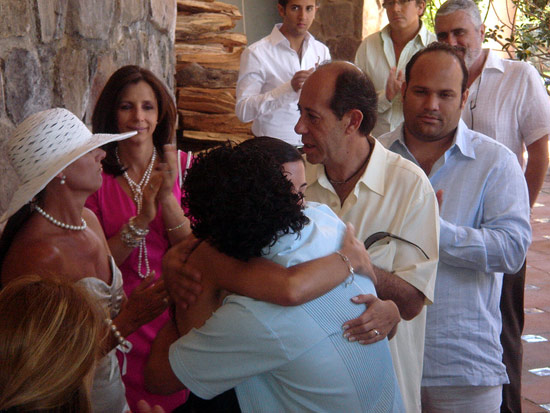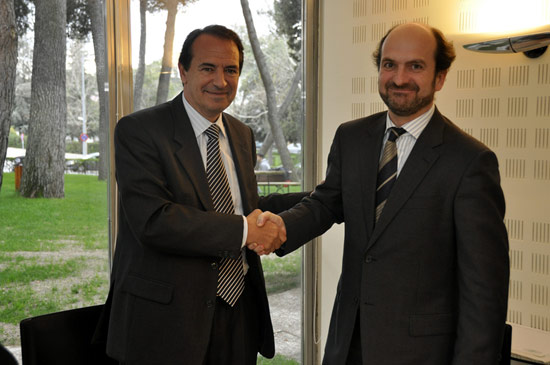Culture and Society: Greetings and Courtesies
General
A traditional, formal, yet highly sociable people, Mexicans exchange greetings in just about every situation imaginable. First time visitors to Mexico are often surprised when complete strangers nod, smile and toss a genial Buenos Dias in their direction when passing down the street. More formal greetings are considered signs of respect and goodwill and using proper titles and terms shows Mexicans that visitors both care about their culture and respect their social position. As part of a society held together by family ties, Mexicans show elders and community leaders an abundance of respect, and extend courtesies to both women and children.
Informal Greetings
Informal greetings are used between family members and friends, and for colleagues in school or work after a degree of familiarity has been established. Mexicans frequently stand very close together when greeting each other, something that may be uncomfortable at first for foreigners, and a handshake is often fortified by a one-armed hug with the free arm. As familiarity blossoms, hugs become longer and closer, and are actually the primary informal physical greeting among close acquaintances in Mexico. When a man meets a woman for the first time, it is customary to bow slightly before shaking hands. The practice of men and women lightly kissing cheeks is also common in Mexico, and usually happens when the relationship is between the handshake and the hug.
In casual greetings, Mexicans adress each other with the informal tu (you). They employ a large variety of friendly informal greetings. ¿Qué tal? (What’s up?) is a common greeting used by young people and passing acquaintances, as is the similar ¿Qué pasa? (Whats happening?). Rather than answer literally, Mexicans usually respond in kind, just like with the informal and ubiquitous Hola (Hello). If friends or acquaintances have not been seen for a while, the most common greeting is ¿Cómo estás? (How are you?), to which the standard reply is Bien. ¿Y tu? (Fine. And you?). When passing strangers in the street, entering a store, boarding a bus, or in other situations where there is no degree of familiarity yet the situation is informal, it is common to use the salutations, Buenos Días (Good morning), Buenas tardes (Good afternoon), and Buenas noches (Good evening). Failure to respond in kind to these passing greetings is seen by Mexicans as rude.
When departing, the most common informal expression is Adios (Goodbye), although other informal phrases such as Hasta luego (Until later) and Hasta la vista (Until we see each other again) are quite common. The strong Catholic influence on Mexican culture is evident in common departing expressions such as Vaya con Dios (Go with God) and Dios bendiga (God bless you).
Formal Greetings
When addressing people who are older, meeting people for the first time, or greeting someone in a formal situation, Mexicans address each other using the more polite usted (you), as in ¿Cómo está usted? (How are you?). Usted conveys respect to the one spoken to.
Titles are used profusely in Mexico and when addressing someone who is not known, it is always appropriate to add Señor (Sir), Señora (Madam), or Señorita (Miss) to the question or statement. This applies to all service workers, such as waiters and taxi drivers, as well as complete strangers on the street. When speaking about senior citizens, who are highly respected in Mexican culture, it is appropriate to use the terms Don and Doña as titles before their first name as a show of reverence.
Upon departure, simple goodbyes such as Adiós are only used when addressing friends, family, or service employees in public, such as shopkeepers and hotel staff. After meeting someone for the first time and engaging in conversation or formal activities, it is appropriate to thank someone, using Gracias, and to add a formal departing expression such as Fue un placer conocerlo/conocerla (It was a pleasure to meet you). Handshakes are exchanged at the beginning and end of formal meetings. As Mexican relationships develop, they tend to become somewhat more casual.
Business Greetings
A handshake is the standard greeting among male business colleagues in Mexico. Women will often exchange a light embrace and a kiss on the cheek. Men will greet women in this fashion, but not at an initial meeting. Business cards are exchanged and distributed when meeting for the first time.
Mexican firms observe tight hierarchies, and many companies are family owned. At formal business meetings, the top-ranking people will be introduced to each other, but not to those of lower ranks. Many Mexican government officials carry business cards that only state their name and title with no contact information. Besides establishing an "I'll call you, don't call me" relationship, this practice is done to prevent unauthorized use of the official's name as a business reference.
It is common to address business associates and partners with the title, Licenciado, which means the person holds a bachelor's degree. Ingeniero (Engineer) and Doctor are also common titles used when addressing or describing associates or professionals. Maestro (Teacher) is used liberally in Mexico to refer those considered proficient in their field.
Conversation Topics
With all the politeness and formality that pervades Mexican society, it would be easy to imagine that arguments and debates seldom occur. Quite the opposite is the case, however, and Mexicans often spend hours embroiled in heavy conversations where politics, philosophy, or religious topics are hotly contested. The difference however, is that etiquette and protocol determine who is involved in a conversation and it is considered rude to enter into another discussion without being invited. It is also considered rude to attack other people’s beliefs with harsh criticism, just because you believe something different.
Controversial material aside, Mexicans share several passions that are almost guaranteed to help strike up friendly banter; fútbol, food, and the ever present telenovela. Mexico, like most of Latin America, holds fútbol head and shoulders above all other sports and most Mexicans can spend hours discussing the strengths and weaknesses of teams and players from all over the world. Mexican cuisine is famous worldwide for its rich sauces and full flavors and each region of Mexico has distinctive specialties which vie against each other for renown. Foreigners who have traveled a bit in Mexico are often asked for their preferences about Mexican food and grilled on which dishes have and haven’t been sampled. Similar to the way children cluster around the television on weekend mornings to catch their favorite cartoons in the United States, Mexican families gather together in the evenings to watch the latest national soap operas, called telenovelas. Foreigners who follow the plots of any of the current top shows will find that they can meet new friends just about anywhere they go.
Taboos
Vulgar language and loud behavior is inappropriate and frowned upon in most Mexican public places and should never be used in front of the elderly or young children. Comparing Mexico with other countries in negative terms is also considered bad taste, as is making fun of or attacking the Mexican flag.
Article written for World Trade Press by Ocean Malandra.
Copyright © 1993—2024 World Trade Press. All rights reserved.

 Mexico
Mexico 
